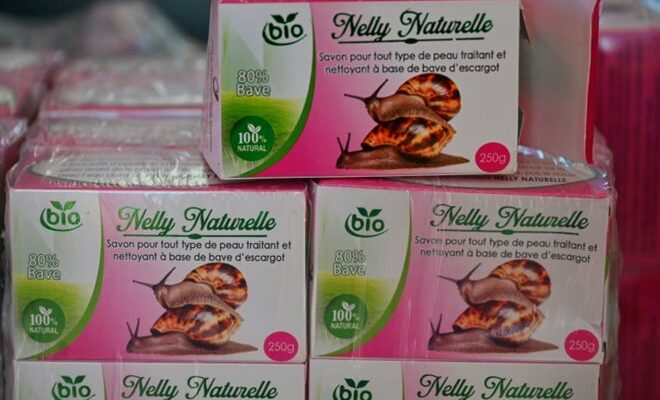A giant snail on the hand of an employee on a breeding farm in Azaguié, Ivory Coast, November 23, 2023 (AFP/Issouf SANOGO)
They can weigh up to 500 grams and measure ten centimeters long: very popular in Ivory Coast, giant snails are disappearing from the rainforest, victims of deforestation and pesticides, but are now raised on booming farms .
In one of them in Azaguié, a town located 40 km north of Abidjan, a building houses around ten brick and cement bins topped with mesh doors. A tin roof, but no walls, just removable black plastic sheeting.
Inside the tanks, a layer of earth, a layer of leaves and, in between, thousands of snails, juveniles and breeders, some of which are impressively large, far from European standards.

An employee waters bins of snails on a breeding farm in Azaguié, Ivory Coast, November 23, 2023 (AFP/Issouf SANOGO)
When reaching adult size, the giant snail can weigh up to 500 grams and reach 10 centimeters in length. The gastropods, which can only live in a humid climate, are watered and fed every two days.
Nearly 90% of Ivory Coast’s forests have disappeared in 60 years, mainly due to agricultural exploitation, particularly cocoa, of which the country is the world’s leading producer.
This regular deforestation and the use of pesticides are fatal to the “wild” snail, whose numbers are decreasing more and more from year to year.
Hence the appearance of livestock farms of varying sizes, the number of which continues to increase. Today there are some 1,500 throughout the humid south of Côte d’Ivoire.
But purists only swear by the “wild” snail captured in the forest, with much tastier flesh according to them, which Bernus Bleu, founder and director of Côte d’Ivoire snail expertise (CIEE), denies, of the largest companies producing, processing and marketing giant gastropods.

Giant snails on a breeding farm in Azaguié, Ivory Coast, November 23, 2023 (AFP/Issouf SANOGO)
His company’s motto, “Same snail, same taste”, ensures that there is no difference between wild and farmed snails.
On the farms, “we reproduce the natural environment of the rainforest snails and they only eat leaves, fruits, vegetables, corn, millet and soya. No pesticides are used, it is entirely organic”, says Alexis Famy, technical coordinator of CIEE.
– “Nothing is thrown away!” –
Azaguié now has around thirty of these farms. Former trader in the suburbs of Abidjan, Jean-Norbert Akéssé, opened his own in 2021 and does not regret it.

A snail seller at a market in Azaguié, Ivory Coast, November 23, 2023 (AFP/Issouf SANOGO)
“It’s profitable !” he rejoices, explaining that after following training, he invested two million CFA francs (3,000 euros). Today, he is the manager of this farm which brings him twelve million per year (18,300 euros), a more than comfortable income in Ivory Coast where the minimum wage is 75,000 FCFA per month (less than 115 euros). . He sells his entire production exclusively to CIEE.
The simplicity of snail farming, its productivity and its profitability have pushed thousands of Ivorians to embark on this sector after having received training: the progress is impressive since in five years, production has increased from 25 to 250 tonnes of snails per month, according to the government.

Employees make soap and shower gel with snail slime in Azaguié, Ivory Coast, November 23, 2023 (AFP/Issouf SANOGO)
CIEE, created six years ago, has 50 farms and processing units, employs 75 people, trains around 200 people per month and helps with their installation. Most create their own livestock farms or group together in cooperatives under contract with the company.
From around 25,000 currently, the sector’s objective is to increase to around 100,000 producers in the coming years.
“Nothing is thrown into the snail!”, explains Bernus Bleu. The flesh, very popular with the Ivorians and in the neighboring countries of the Gulf of Guinea, is eaten with a spicy sauce or grilled on skewers, the slime is used to make soap, shower gel or ointment, while the powder of the shell is used in the manufacture of other cosmetics, pharmacopoeia, animal feed.

Soaps made with snail slime in a factory in Azaguié, Ivory Coast, November 23, 2023 (AFP/Issouf SANOGO)
At the CIEE headquarters in Azaguié, four women make soap and shower gel from snail slime, mixed with coconut oil, green coloring and perfume. On average, 5,000 soaps and 5,000 bottles of gel come out every week from the small workshop with rudimentary equipment.
Head of the workshop, Nelly Blon says: “snail slime hydrates the skin, removes impurities and prevents its aging.”
© 2023 AFP
Did you like this article ? Share it with your friends using the buttons below.




